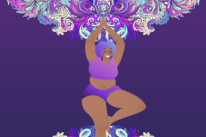
“We are all faced with a series of great opportunities brilliantly disguised as impossible situations.” – Charles R. Swindoll
For twenty-something me, a college drop-out utterly overwhelmed with choice and bewildered by unemployment, it can easily feel like a void of nothingness, so black and dense there is little point in considering a future beyond it.
I see friends studying Economics, English, and Engineering. They’ve joined their circus, and I haven’t even started yet. I’m behind, I’ll never catch-up; I’ll be the kid that got held up.
College has structure, solidity, a process, respect, certification, and a certain standing. Without it I’m a light-weight who dropped out and couldn’t handle it. I’m fit to flip burgers and shut up.
Or, maybe it’s okay to try a different method of travel for the time being.
Feeling a thousand times behind, like I wasted time—this is the feeling that mired me in a rut. Falling into the rut is different for all of us, but how we get out? Not so different.
When we imagine the worst possible outcome for our choices, this creates that pit-in-the-stomach feeling, which then cycles in our head, until suddenly it seems like our whole world is falling apart.
I’m sure there are many people out there like me, maybe of a different age, feeling stuck, confused, nervous, anxious, and not just lost but somehow behind.
I was stuck dwelling on everything I thought I did wrong, when it occurred to me that I couldn’t find any solutions until I cleared my head. Only when I stop obsessing and over-analyzing can I think clearly and make decisions I can trust.
So I did that, and started to find my way out of this rut. Here is what I learned:
Getting uncomfortable can be a good thing.
I’m naturally reserved. I’m quiet and shy, and it’s easy to let that hold me back. It’s easy to ignore people instead of engaging in conversations; which means I can miss out on opportunities just because I feel uncomfortable.
When we sit in the background and choose not to contribute, we’re not taking responsibility for our lives. We are the only ones who can make the effort and change things. Sometimes it’s the most uncomfortable moments that lead to an important connection or spark of inspiration.
We need to know it’s not “us against the world.”
I sat in my room aimlessly for next to a year wallowing in a pool of self-pity. I’d collected a nice little reservoir of things to worry about. My “analysis paralysis” was my imaginary friend.
This victim complex is a sure route to staying stuck, because we end up feeling like outsiders, as if everyone is against us, when really it’s just a matter of perception. If we feel left out or behind, it’s not because other people are doing it to us; it’s how we’re choosing to react to life.
The best way to get unstuck is to start creating the work that only we can.
This follows on from Seth Godin’s idea that real artists “ship.” People who are successful in any field constantly put their ideas out into the world. A good idea is one that has been shipped out into the world; a bad idea is one we’ve kept to ourselves because we were scared to share it.
This sense of contributing the work only we could is satisfying. We need to let ourselves be curious about what we have to offer.
We have to get over the voice that says, “There’s no point in even trying that.”
For me, writing became therapy. Teasing out ideas on paper comforted me. Those ideas turned into blog posts and this became a passion that could ease me even on the worst days of unemployment.
The key to getting out of a rut, I’ve found, is actively investing yourself in passions that resonate with you.
Steven Pressfield, author of The War of Art, makes no bones about it: He blames our social ills, anxiety, and pill-popping tendencies on our habit of giving into the resistance (the voice that tells us we can’t do things) and not doing the work that matters to us.
Perhaps we would do best by acknowledging those things we know we love.
To have a vision to fulfill is perhaps our greatest asset. To give our day-to-day struggle a sense of meaning, of effort and reward, we’d do well to spend time creating the things that satisfy us fully.
My work became a little easier when I knew there was something I was building. Dull bus commutes and rainy days in the same old city became less bothersome because of the knowledge that I was doing something that mattered to me, maybe not as a job, but at home.
Our passions can’t always be rendered with a job description, and this can deter us from pursuing them. They can seem like a guilty pleasure we keep on the side, something without a point. But the point resides entirely with us.
The first step is getting curious, allowing yourself to identify or reconnect with whatever it is that gets you excited.
From there, the only choice is to start—to invest your free time and energy, instead of making excuses not to do it.
There are only a certain number of hours in the day. If we have to work jobs that aren’t aligned with our passions, they will ultimately take up a great deal of our time. This may seem like a burden but maybe it can be an advantage.
Structure can actually enhance our creativity and productivity. Most well-known writers always sit down to write at a certain time each day and keep the routine. Infinite spare time isn’t necessarily a good thing. Sometimes having an element of constriction forces us to schedule in the work that matters to us where we can, so that we ensure it gets done.
Those activities we pursue, those business ventures we start, those blogs we keep, those things we pursue on the side, all give meaning to our every day, and they can all turn into something bigger given time and work.
Having something to contribute to, knowing that you are shipping something that is completely yours is deeply fulfilling. This is how I found my way out of my rut, and it may be what does it for you too.
Nothing could be more essential to living than doing what matters to us most—whether we do it for work or not.
Photo by Jiaren Lau













 Though I run this site, it is not mine. It's ours. It's not about me. It's about us. Your stories and your wisdom are just as meaningful as mine.
Though I run this site, it is not mine. It's ours. It's not about me. It's about us. Your stories and your wisdom are just as meaningful as mine.
As 26-year old college student who is about to graduate, I will tell you that I actually wish that I would have had the courage to go and pursue my real passion–instead of being fearful of not being successful or making my parents proud . In fact, I feel like I took the easy road by going and following this path that has already been paved.
It takes courage to live a unique and meaningful life. Not everyone is ment for college and MANY of the most brilliant minds that have existed never attended/graduated college.
What college has taught me more than anything is how to be confident, persistent, and face my fears. That can be learned by many various avenues–not just through college; it sounds like you have learned this. Embrace YOUR unique and beautiful life.
Great article.
Brittany, please do what makes you happy, not what others expect you to do. If you don’t, you’ll regret it. If others aren’t supportive of your path then it’s their loss, not yours. I have several regrets in my life, and career path is one them. Don’t let fear stop you.
Agreed. The writer learned those ideals you talked about without college. Freaking amazing. I can tell you are an awesome person too and congratulations for that and you will probably accomplish awesome things.
Someone says it about every blog but, I hope that will not take a single ounce of meaning away from me saying, this is exactly what I was supposed to read at this exact moment in time.
I have been wallowing in rut for way too long now and just 3 days ago I told myself it is time to do something about it. I am trying to ween myself off of my doctor perscribed life-line, his idea of a “cure” for my anxiety obsession (xanax) and it has been painfully difficult. I have been stressing about how I am going to feel, what if I feel uncomfortable or anxious with out them… how will I get through work tonight? And, reading this just reinforced exactly why I am doing this. Because without feeling uncomfortable, I will never get to where I ultimately want to be. I must go through this if I ever wish to start LIVING and not just going through the motions waiting for each day to end.
*There are no shortcuts to anywhere worth going*
Thank you<3
There are many kinds of “uncomfortable”. Nobody likes being on meds, though when going off of something taken for a long period of time, best to let Doc know-especially when having anxiety hx. The physical discomfort of that type of change can be enormous. One can greet new opprtunities and start living even on a lesser amount of medication, seeing how that works and then making decisions- should you change your mind and decide to stay on something, whether the same med, something different- or a “as needed”. Please receive this in good health and well wishes.
I agree you have to probably slowly ween off your medication. Not realy something totally a motivational post is really encouraging you to do. Definitely follow directions on how to get off the drug
While, I thank you for your input… I never said that the post was the reason behind my decision. I was on this path well before I even knew this blog post existed. I very well educated in this type of issue both formally as well as through experience, and also under the guidance of a medical professional. The purpose of my post was to let the author know how this wonderful piece resignated with me, and helped to serve as a reminder of why I should not be afraid of the discomfort I have in leaving my “crutch” behind. I hope my thanks has not been diluted by the mildly insulting comment above.
I understand the intentions were likely well, I just wish to not distract from the writing and its purpose.
Wonderful best of luck to you… Thanks for sharing your wisdom!
Great article, thank you!
I can really relate to this. I feel really behind and I am afraid of never actually moving forward. I have a degree in something I don’t like at all, almost no work experience (in anything) and trying to start a career in the arts. I deeply believe in what I want to do, but it’s so much pressure that it makes it hard to be inspired and get really creative. I’m always worrying about what will be, if I’ll reach my goals, and how awful it will be if I don’t. It’s exhausting.
Your words are of great help. Thank you very much for sharing them 🙂
dont f888in worry and just do it. Everyone starts off a beginner at everything. Dont ever discourage someone from anything. Good luck.
This article came at the perfect time as I had the realization just yesterday that I too have been in a mental rut. I resorted to inspiration themed YouTube videos to kick me out, at least temporarily. Synchronicity is an amazing thing. Thanks for the great article.
Absolutely inspiring and is exactly what I needed to hear. Thank you. <3
Thank you.
Great timing! I think this is almost an epidemic in this country with the many of us who are unemployed. We have had it ingrained in our minds to work hard and be responsible to that structure, even if it doesn’t suite us. I was a workaholic and never did anything outside of work. When my partnership ended after 4.5 years, I found myself lost. It has been a little over a year and have played the victim and that the world is against me. Felt guilty for doing things that I never used to do. Until I do them, I feel so liberated, just simple things like driving to the mountains.
When you are working or have a purpose, you have a drive. When you don’t you don’t move. I try now to set aside time just as I would have at my office to do certain tasks and feel more stable. Our world is so full of distractions that it is hard to get back to the basics when that is exactly what you need to start over. When you remove some of the distractions you will feel more free to find you, and just you. FB and Twitter make us focus on what other people are doing versus what we are doing. Try not using them for a day and see how you feel. Trust me you will be amazed!
I completely agree with what you said about Facebook and Twitter. I am constantly checking them, and I find myself longing for other people’s situations. I need to live my own life and define success in my own way. I recently graduated from college, and most of my friends have found jobs or are going to grad school. I have moved back home, where I have a part-time job. I am finding it very difficult to get out of my rut; I cannot discover any of my passions that I can translate into a career. I am just working on taking one day at a time.
Yeah man, this is absolutely inspiring coz this is the problem, many of us face in our regular life
Excellent post! Speaking of Pressfield’s “The War of Art,” have you read the recent Domino Project release “The Flinch” by Julien Smith?
“behind” is exactly how I feel, thought I’d be somewhere completely different by now….
Medications are of short term assistance to help stabilize otherwise mentally healthy individuals. I have seen more damage done by psychiatrists with medications than in any area of medicine. Changing how we Think about feelings and Problems is the solution to good mental health, Not More or different medications. I have known people to have sustained Severe Permanent Brain Damage because of these medications. The family or spouse or whoever insists on medications (so They will feel better ) and the psychiatrist says absolutely ( to CTA legally ) and the person is chemically lobotomized. May what goes around , come around for all those involved.
Very very true, I’m sending this to my brother.
[…] Getting Out of a Rut and Working on a Passion | Tiny Buddha: Wisdom Quotes, Letting Go, Letting Happ…. […]
“Having something to contribute to, knowing that you are shipping something that is completely yours is deeply fulfilling. This is how I found my way out of my rut, and it may be what does it for you too.” This was really touching for me since im also in that stuck in the middle stage of my life.
My dad is a millionaire, but im starting out with a small venture of my own next month. Just what i wanted to hear.. Thanks!!
this articles bang on !! but i gotta admit iv been in this place like 100 times in last 5 yrs , self loathing and then back to life , can someone tell me if this happens to them from time to time?? ..or i guess i havent given my best shot yet thats why i keep goin back into my shell . thanks MArc .
ADI – I have a very similar thing, massive fluctuations. I’m quite young, 17, and most of the time I feel amazing about myself and my life, my college/university futures etc. but sometimes I just go through ruts like the one I’ve been in for the past week.
I’m hoping its mostly teenage mood swings, and it will stabilise.
But in a way I think it’s very important to have difficult periods. It takes the darkness to show us the light.
thank you for the post, it was a wonderful read and really resonated with me. Keep up the blogging!
I have been going through this gloomy for a couple of days. This helps, thanks.
i think I have stumbled upon the inspiration I so badly needed.
A million thanks.
I found some of this helpful. Unfortunately it is not possible for everyone to drop their responsibilities and do what they love. I am in college to pursue a degree to do what I want to do and I have to work to fuel that dream. I don’t have time to write or read unassigned texts. It is beautifullt written and really is great advice for some who has got the time.
I have to say; it’s quite scary how you described exactly what I am currently going thru: I just want to thank you for what and how you explained that. Your words have been super therapeutic and helpful to me. Thank you
Awesome post! Expressed every rut-associated feeling I’ve been dealing with and each tip gave me a good feeling inside just from reading. Thank you! The universe appreciates your help
Thank you for your article. It is exactly what I needed to read at this moment.
This post really resonated with me. So much of what you have said perfectly encapsulates so many of my thoughts and feelings. Thank you for this.
I need to change. I need to change the way I see, the way I think. I feel I have been digging myself deeper into nothingness. The fog is getting thicker. Trying to improve has felt like trying to find the end of a giant ball of yarn. I’m on autopilot now, doing things that distract me from my own reality. Escaping. But then I think about my future. If I don’t change, I’m going to die just like this; always trying to escape, to run away from the reality. Never having truly lived. And that just makes me sad. Sadder than I have felt in a very long time. I don’t want to be like this. I want to be happy. I want to think like a happy person thinks. I want to do what a happy person does… I need to start painting again.
While a lot of what I read on TinyBuddha seems very relateable and makes sense, about half way through every article, I begin to realize that what I’m reading is a generalized view of a situation and offers no real help really.
I’m sorry for this negative-ish criticism but that’s how I feel about a lot of the articles I read here.
“The key to getting out of a rut, I’ve found, is actively investing yourself in passions that resonate with you”
I loved this quote and completely agree! I’ve recently been in a rut due to realizing the streamlined nature of my life up until this point. I’m going to be a Senior in college, and have no interest in everything that my peers, parents, teachers, and advisors want for me for the first time in my life. Because of this, I’ve really tried to figure out and pursue my passions and want to translate these passions into a career that I can truly be happy with upon graduating college. Would love any comments or critiques of my site
http://www.alterapathy.com
But awesome article and even better advice! 🙂
What an honest and great article. You’re lucky to feel strongly about something and create work that matters.
What if you can’t find anything your passionate about or that matters to you to ship out to the world?
I don’t have the energy to do anything, and I’m sick of being lectured to. Nothing inspires me any more
“The key to getting out of a rut, I’ve found, is actively investing yourself in passions that resonate with you.”
This isn’t an easy thing in the first place, of course, but is made all the more difficult when you (or I, more specifically) no longer get excited by anything.
Thank you